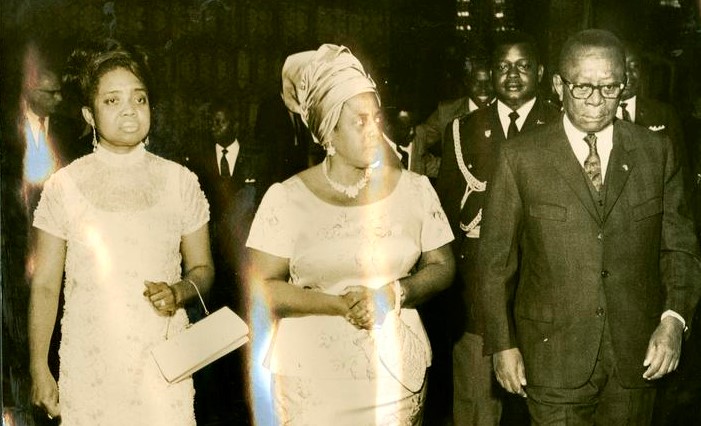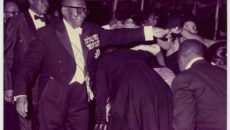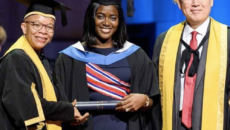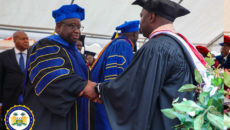A 2017 photo essay by The Bush Chicken provided readers with a virtual tour of President William V. S. Tubman’s farm outside of Totota, Bong. The piece noted that the farm was briefly transformed into a memorial museum, housing Tubman’s presidential papers.
The papers were broadly cataloged in early 1979 by Christopher Clapham, a political scientist then based at Lancaster University in the United Kingdom. He estimated that the collection held 30,000 documents. Clapham’s report of this endeavor facilitated efforts by Indiana University shortly after the end of the war to preserve and collect the looted papers. It was then estimated that 40,000 pages of material survived. Some of the surviving papers have been digitized and can be viewed online as a result of that project and the full collection is available on microfilm. Despite the existence of this collection and the outsized role Liberia played in the formation of the African Development Bank and the Organization of African Unity in the 1960s, Tubman’s presidency remains understudied.
While Clapham focused on the Horn of Africa and Ethiopia for the bulk of his academic career, his earlier work was marked by comparative studies of Sierra Leone and Liberia. He first visited Liberia during the final years of the Tubman government and returned for extended fieldwork in the mid-1970s. As a result of difficulties conducting research in Liberia under the Samuel Doe regime and during the civil war, his focus returned to the Horn and Ethiopia, the latter the subject of his doctorate. He was a longstanding editor of the Journal of Modern African Studies and now holds an affiliation with the University of Cambridge.
As Liberia seeks to turn a corner in the consolidation of its democratic system, the preservation of the work and legacies of its leaders will become an increasingly germane issue. The family of William Tolbert, Jr. established a foundation to honor Tubman’s successor and President Ellen Johnson Sirleaf has now turned her attention to buttressing her legacy through a presidential center, an effort that builds on the publication of her biography while she was in office.
The Bush Chicken spoke with Clapham about his experience reviewing Tubman’s papers at the request of the late president’s widow, Antoinette Tubman. She had hoped to establish a Tubman presidential library, along the lines of the U.S. system. The written exchange between Brooks Marmon [BM] and Clapham [CC] has been lightly edited.

A passport photo of Christopher Clapham. Photo courtesy of Christopher Clapham
BM: How did President Tubman’s widow come to approach you for this project?
CC: I cannot remember how I came to be asked, though it was certainly through the Tubman family, rather than the Liberian government. It must have resulted, one way or another, from awareness of my book, Liberia and Sierra Leone: An essay in comparative politics, which had been published in 1976. Very possibly, it may have come from an approach by Mrs. Tubman to the British Embassy in Monrovia.
BM: Following your work in 1979, are you aware of any further progress that was made in establishing the Library?
CC: I have no idea what (if anything) happened to establish the Tubman Presidential Library after I left Liberia. I simply submitted my report to Mrs. Tubman, and any further action was for her to take. Shortly afterward, of course, the True Whig Party regime was overthrown in the coup d’état led by Samuel Doe, followed by the murder of many leading figures in the TWP regime, after which the project would have been effectively impossible. I next became aware of the subject many years later, in 2005, when I was asked for a recommendation in the context of an application for funding by Dr. Verlon Stone, a leading academic in the study of Liberia, to rescue and restore the remaining parts of the archive.
BM: Did you have any interactions with President Tolbert’s administration while processing the Tubman papers?
CC: No. This was entirely an initiative by Mrs. Tubman, whose relations with the Tolbert administration were at best rather distant.
BM: Did you ever make use of the materials in any of your own research? Are you aware of any scholars who have used these papers?
CC: I had no opportunity to use these materials while I was cataloging the archive, since this task took up all of the available time, and – given Liberia’s subsequent collapse into civil war – I doubt whether anyone else was able to do so, at least until peaceful conditions had been restored.
BM: Your report notes that the middle part of Tubman’s administration was poorly represented in his papers. Why do you think this may have been?
CC: I don’t know. The papers that I was engaged in cataloging consisted in piles of documents which had accumulated in one way or another, with no indication of how they came to be in Tubman’s country estate in Totota, or why they had been preserved.
BM: Are there any documents that were particularly memorable?
CC: The documents that most struck me were the very large number of pleas and petitions sent to the president by ordinary Liberians, usually in the hope that he would be able to do something for them. These provide a vivid testimony to the way in which Liberians thought of the president, as well as to the day-to-day issues that affected them.
On the other hand, there was virtually nothing from any of the ‘big men’ of the TWP administration, since those with personal access to the president would go to him directly. Nor are there any of the policy papers that one might expect in a bureaucratized administration. This was a very personal government that operated overwhelmingly by word of mouth.
BM: Your unpublished report on President Tubman’s papers makes considerable reference to Tubman’s correspondence with the emerging African leadership of the 1960s. Do you believe that the uncertain availability of these papers has inhibited scholarly understandings of Liberia’s position in pan-African diplomatic circles during this era?
CC: Unfortunately, I had no time to examine these papers for the revelations which they may have contained about Liberia’s relations with Africa at a particularly important period for the development of continental diplomacy. Nonetheless, I would think it unlikely that they contain much of great importance.
For one thing, key relations with other African leaders would have been conducted on a face-to-face basis. For another, Liberia did not enjoy anything like the prominence of the other longstanding independent African state, Ethiopia. It was small, closely associated with the United States, and widely viewed elsewhere in Africa as a neo-colonial enclave. There were a lot of documents generated by official occasions, such as menus for state banquets and official photographs of the president with other African leaders, but these conveyed very little information.
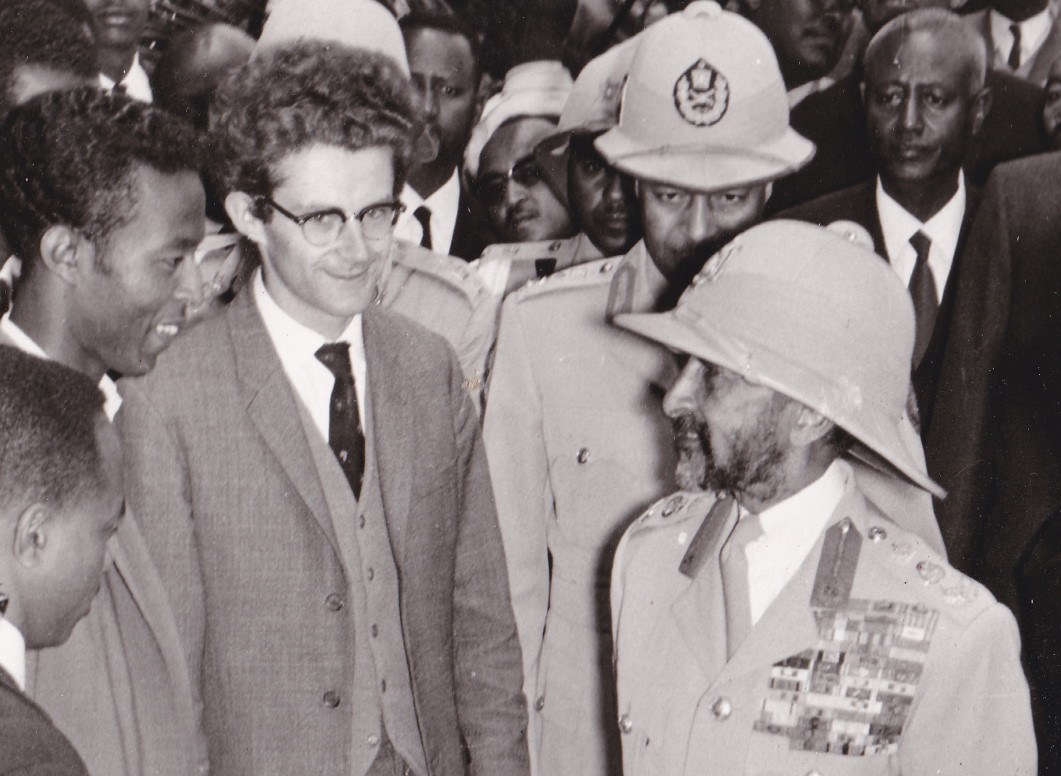
Christopher Clapham and Haile Selassie. Photo courtesy of Christopher Clapham
BM: What were your personal views on President Tubman’s leadership? Did his long tenure in office, unprecedented in Liberia’s history, contribute to the tumult that ensued after his passing?
CC: Tubman was an absolutely brilliant, folksy, hands-on politician. He had enormous charm and related to people on a personal level, without a shred of the pomposity characteristic of many national leaders (including his successor, Tolbert). He liked to be known by his favored first-name, Shad (short for Shadrach), and his latest jokes and sayings were enjoyed and repeated all over Liberia. He likewise had a prodigious appetite for whiskey (Johnny Walker Black Label) and (so it was widely said) for women.
Running Liberia (which then had a population of only about one million) effectively as a personal estate, he was able to keep in touch with a very high proportion of the people who mattered, and – as indicated by the number of personal letters in the archive – to appear to ordinary Liberians as someone with a real interest in their welfare. This certainly made him a very hard act to follow, and Tolbert conveyed a very different persona. However, the basic problems of True Whig Party Liberia, with the continued dominance of a tiny coastal elite, were basically structural rather than personal, and Tubman’s dominance may have delayed the day of reckoning, but could not prevent it.
BM: What were your impressions of Liberia? Did Tolbert’s government seem to be on its last knees in 1979?
CC: It was very clear that the old True Whig system could not be maintained indefinitely, but predicting when and how it would go, and what would replace it, was a different matter altogether. The Tolbert administration was aware of the need for change and was taking steps to include more up-country people in government, but something much more radical would be needed.
On the surface, the government continued as it always had done, and I was able to travel around on country buses and taxis without getting any sense that it was about to collapse; that the government would soon be overthrown by an uneducated sergeant, resulting in the mass murder of leading figures in the government and followed by complete state breakdown was entirely unpredictable.
BM: How were you catered for while processing the papers? Where did you stay?
CC: I stayed in the guest room of the main building on the Totota farm, pictured in one of your photographs. This was where all the papers were, so it was very convenient. For food and the occasional beer, I walked down to the bar on the main road, just by the gates to the farm, called ‘Coocoo’s Nest’ (Coocoo being the name of the Tubmans’ daughter).
Apart from that, I lived a thoroughly monastic existence, sorting out the papers all day. I can’t even remember whether I went into Gbarnga, though I knew the town well from my fieldwork earlier in the 1970s.
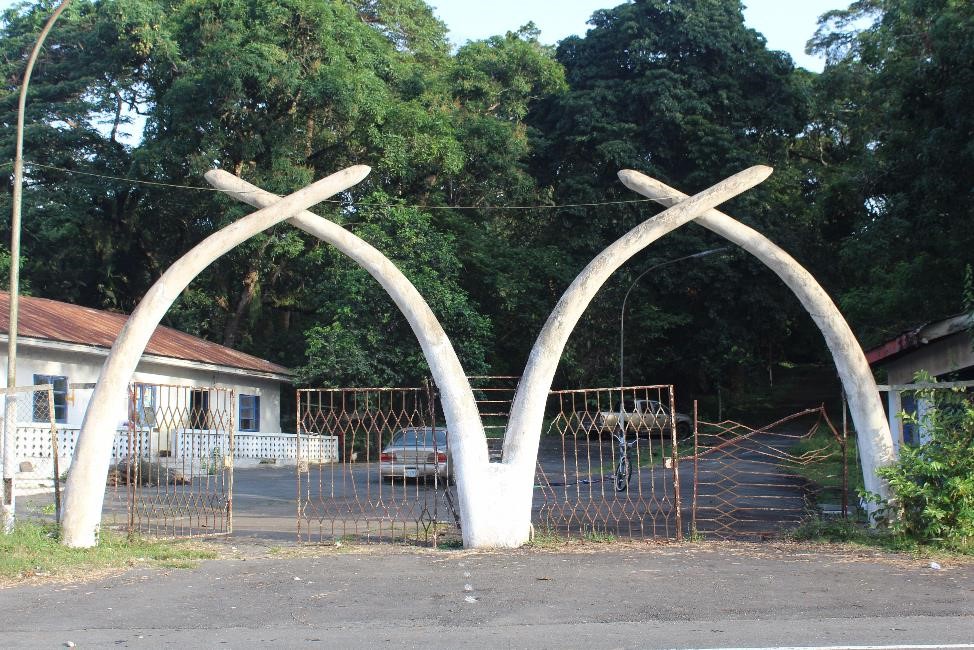
The entrance to the Tubman Farm in Totota. Photo: Lloyd Massah
BM: Based on your efforts in 1979, do you have any advice for former President Ellen Johnson Sirleaf as she seeks to preserve her legacy?
CC: Preserving archives is a much easier job now than it was forty years ago, because of the widespread use of computers and other ways of storing and transmitting data. My only advice, and very obvious, is to duplicate the data as far as possible and make sure that it is accessible outside as well as inside Liberia.
Featured photo courtesy of Indiana University’s William V. S. Tubman Photograph Collection
